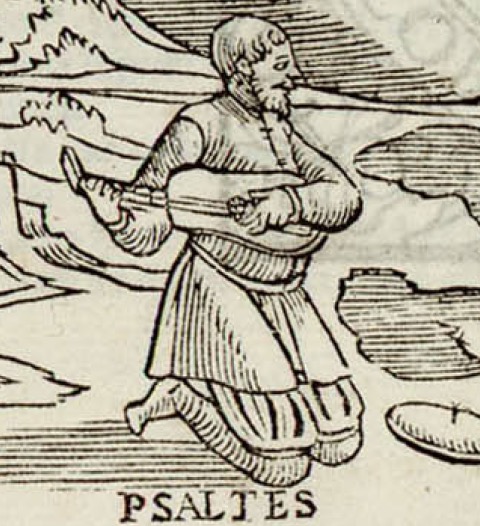Psaltes playing the vihuela, in Alonso Mudarra, Tres Libros
(1546) - Mudarra,Tres Libros...
instrument: vihuela de mano / guitarra | century: 16cent/2/mid | catalogue nº: 16-204

Artwork
Creator León, Juan de
Medium Artwork: Woodcut
Location
City Sevilla | Region Andalucia | Old kingdom Castile
Characteristics
| Body Waisted | Strings 3 strings | Neck Long | Pegbox R/Angled flat |
| Bridge Fixed | Frets Yes | Back Not visible | Pegs |
| Technique Plucked fingers |
Commentary
ARTWORK
Woodcut included in Alonso Mudarra, Tres Libros de Musica, 1546, Libro III, fol [58], frame 221 of the Biblioteca Digital Hispana digital reproduction. It depicts a character named Psaltes kneeling while playing and singing. Unusually the vihuela is in reverse direction or, less likely for the age, being played by a left-handed player. It is added to the final page of tablature in Mudarra’s book (lib. III, fol. 28) and depicts a biblical scene shown in a contemporary setting. The inscription above the woodcut “iiij Reg. Caput.iij” suggests “IV Kings, Chapt 3” but in fact it is from II Kings 3:15. The second half of the verse is included in the woodcut: “Cumque caneret Psaltes, facta est Super eum manus domini” (And it came to pass, when the minstrel [Psaltes] played that the hand of the Lord came upon him [Elisha]). The woodcut, therefore, depicts the minstrel (Psaltes) and the prophet Elisha (ELISEVS PROPHE) on a mountain receiving the word of the Lord.
INSTRUMENT
The vihuela is small and not depicted with detail. The body has incurved waists with the uppr bout narrower than the lower. It has a only partially-visible fixed bridge and a single soundhole with rosette located almost in the centre of the instrument. Only three strings are indicated. It has a short neck indicating frets finishing in a flat angled pegbox with no tuning pegs depicted. It appears to have a flat back. The instrument is being plucked with a technique showing the thumb and index aligned, not clearly either figueta “extranjera” o “española”.